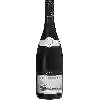
Winery Les GueretsSaumur-Champigny
This wine generally goes well with
Details and technical informations about Winery Les Guerets's Saumur-Champigny.
Discover the grape variety: Pirobella
Interspecific crossing, obtained in South Africa in the 1960s by E.P. Evans, between the 15 Pirovano (madeleine angevine X bellino) and the isabelle. It should be noted that from this cross was also born the black muska.
Last vintages of this wine
The best vintages of Saumur-Champigny from Winery Les Guerets are 2017, 2014, 2016, 2015 and 2013.
Informations about the Winery Les Guerets
The Winery Les Guerets is one of of the world's greatest estates. It offers 2 wines for sale in the of Saumur-Champigny to come and discover on site or to buy online.
The wine region of Saumur-Champigny
The wine region of Saumur-Champigny is located in the region of Saumur of Loire Valley of France. Wineries and vineyards like the Domaine Clos Rougeard or the Domaine Clos Rougeard produce mainly wines red, white and pink. The most planted grape varieties in the region of Saumur-Champigny are Cabernet franc, Cabernet-Sauvignon and Chenin blanc, they are then used in wines in blends or as a single variety. On the nose of Saumur-Champigny often reveals types of flavors of smoke, grass or yellow apple and sometimes also flavors of tree fruit, oil or banana.
The wine region of Loire Valley
The Loire Valley is a key wine region in western France. It follows the course of the Loire River on its Long journey through the heart of France, from the inland hills of the Auvergne to the plains of the French Atlantic coast near Nantes (Muscadet country). Important in terms of quantity and quality, the region produces large quantities (about 4 million h/l each year) of everyday wines, as well as some of France's greatest wines. Diversity is another of the region's major assets; the styles of wine produced here range from the light, tangy Muscadet to the Sweet, honeyed Bonnezeaux, the Sparkling whites of Vouvray and the juicy, Tannic reds of Chinon and Saumur.
The word of the wine: Aqueous
Said of a diluted wine for which one has the impression that water has been added.










